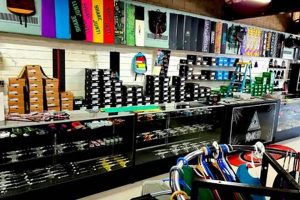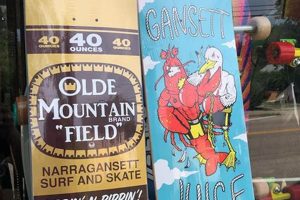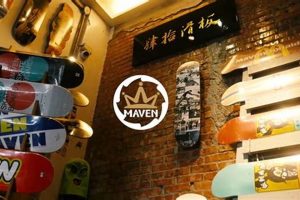A retailer specializing in skateboarding equipment and apparel caters to a range of customers, from novice riders to experienced professionals. This establishment typically offers a curated selection of skateboards, components such as decks, trucks, wheels, and bearings, and protective gear like helmets, knee pads, and elbow pads. The specific product offerings frequently reflect current trends and technological advancements within the skateboarding industry.
Such a business provides value to the skateboarding community by offering expert advice, high-quality products, and a gathering place for enthusiasts. Historically, these shops have played a significant role in fostering the growth of skateboarding culture, sponsoring local skaters, and hosting events that contribute to the sport’s development. They act as a vital link between manufacturers and consumers, ensuring that riders have access to the necessary equipment and knowledge to safely and effectively pursue their passion.
The subsequent sections will delve into specific aspects related to operating and marketing a skateboarding retail outlet, including inventory management, customer engagement strategies, and the impact of online sales channels on the brick-and-mortar business model. These elements are crucial for ensuring sustained success in a competitive market.
Expert Guidance for Skateboarders
The following recommendations aim to provide skateboarders of all skill levels with actionable advice to enhance their performance, safety, and overall experience. These suggestions are based on industry best practices and years of experience serving the skateboarding community.
Tip 1: Prioritize Protective Gear: Consistent use of a properly fitted helmet is paramount. Knee and elbow pads are strongly advised, particularly for beginners and when attempting new tricks. Wrist guards can further mitigate the risk of injury.
Tip 2: Select Appropriate Equipment: Matching the skateboard setup to the rider’s size, skill level, and intended use is crucial. Consider deck width, truck height, and wheel durometer based on individual preferences and riding style.
Tip 3: Maintain Skateboard Components: Regular inspection and maintenance of skateboard components are essential for optimal performance and safety. Check for loose hardware, worn bearings, and damaged wheels. Replace parts as needed.
Tip 4: Master Fundamental Skills: Before attempting advanced tricks, focus on mastering fundamental skills such as pushing, balancing, turning, and stopping. These foundational skills are essential for building confidence and control.
Tip 5: Choose Safe Skateboarding Environments: Select skateboarding locations that are free from obstacles, traffic, and other hazards. Designated skate parks and smooth, paved surfaces are recommended.
Tip 6: Learn Fall Techniques: Practice safe falling techniques to minimize the risk of injury. Rolling, tucking, and distributing impact across multiple points of contact can help reduce the severity of falls.
Tip 7: Seek Guidance from Experienced Skaters: Learning from experienced skaters can provide valuable insights into technique, trick execution, and safety practices. Consider taking lessons or joining a local skateboarding community.
Adhering to these recommendations can significantly improve the skateboarding experience, enhance rider safety, and promote long-term engagement with the sport.
The subsequent sections will explore more detailed aspects of skateboard maintenance and advanced riding techniques.
1. Product Variety
Product variety is a critical component for a skateboarding retailer. A limited selection can deter potential customers, while a comprehensive inventory attracts a wider demographic and caters to diverse skill levels and preferences. This correlation directly impacts the establishment’s ability to serve the skateboarding community effectively and maintain a competitive edge. For instance, offering a range of deck sizes, truck brands, wheel durometers, and bearing types enables skaters to customize their boards according to their specific riding styles and needs.
Furthermore, a well-curated product assortment allows a retailer to cater to both novice and experienced skateboarders. Beginners may require guidance in selecting appropriate starter equipment, while seasoned riders often seek high-performance components or niche items. A skateboarding retailer demonstrating proficiency in product knowledge enhances its credibility and builds customer trust. Furthermore, inventorying various protective gear, such as helmets, pads, and wrist guards, supports the safe practice of skateboarding and fulfills a crucial customer need.
The success of a skateboarding retailer hinges on understanding the importance of product variety and adapting inventory to meet evolving customer demands and emerging skateboarding trends. Failure to maintain a diverse and relevant product offering can result in lost sales and a diminished reputation within the skateboarding community, ultimately affecting long-term viability. This connection between product variety and the retailers success underscores its importance for sustained operational effectiveness.
2. Community Engagement
A skateboarding retailer’s connection to its local community extends beyond mere commercial transactions; it forms the bedrock of its long-term sustainability and cultural relevance. Active community engagement fosters customer loyalty, promotes brand advocacy, and contributes to the growth of skateboarding within the region. For instance, a skateboarding establishment that sponsors local skateboarding events, such as competitions or demonstrations, demonstrates a commitment to the sport and its participants, creating goodwill and strengthening its reputation within the community. Such initiatives provide platforms for local skaters to showcase their skills, encouraging participation and fostering a sense of belonging. The reciprocal effect is increased visibility and positive brand association for the retailer.
Furthermore, the retailer can establish itself as a hub for skateboarding enthusiasts by hosting workshops, clinics, or film screenings. These activities provide valuable educational opportunities for skaters of all levels, enhancing their skills and fostering a sense of community. Organizing regular skate jams or meet-ups further encourages interaction and camaraderie among local skaters, solidifying the retailer’s position as a central gathering place. By actively supporting and nurturing the local skateboarding scene, the retailer cultivates a loyal customer base and gains valuable insights into the evolving needs and preferences of its target market. This dedication allows the shop to tailor its offerings and services to better serve the community, further enhancing its value and relevance.
In conclusion, prioritizing community engagement is not merely a philanthropic endeavor for a skateboarding retailer; it is a strategic imperative that drives customer loyalty, enhances brand reputation, and ensures long-term viability. Failing to actively participate in the local skateboarding scene can lead to isolation and a diminished presence within the community, potentially resulting in a decline in sales and brand relevance. By embracing community engagement as a core value, a skateboarding retailer can establish itself as a vital and respected member of the local skateboarding ecosystem. The shop can create a symbiotic relationship wherein both the skateboarding establishment and the community thrive.
3. Expert Knowledge
Expert knowledge forms a foundational pillar for a skateboarding retail establishment. Possessing comprehensive knowledge of skateboarding equipment, techniques, and industry trends is not merely advantageous; it is essential for building customer trust and fostering long-term relationships. For example, a staff member capable of accurately assessing a customer’s skill level, riding style, and preferred terrain can recommend the optimal skateboard setup, including deck size, truck selection, and wheel durometer. This personalized guidance enhances the customer’s skateboarding experience, increases safety, and solidifies the retailer’s credibility.
The provision of expert knowledge extends beyond product recommendations. A skateboarding retail shop with knowledgeable staff can offer valuable advice on skateboard maintenance, repair, and customization. This includes guidance on bearing cleaning, grip tape application, and truck tuning. Hosting workshops or demonstrations on these topics further reinforces the retailer’s expertise and provides a valuable service to the skateboarding community. Furthermore, expert knowledge enables the retailer to stay abreast of technological advancements and emerging trends within the skateboarding industry, ensuring that the shop carries the latest and most innovative products. This proactively meets the evolving needs of discerning skaters.
In conclusion, expert knowledge is not merely a desirable attribute for a skateboarding retailer; it is a critical component of success. It fosters customer trust, enhances the skateboarding experience, and positions the retailer as a trusted resource within the community. The ability to provide informed advice, perform expert repairs, and stay current with industry trends is paramount for sustaining a competitive advantage and building a loyal customer base. Prioritizing the development and maintenance of expert knowledge among staff is therefore a strategic imperative for any skateboarding retail business that aspires to long-term success.
4. Local Sponsorship
Local sponsorship constitutes a significant component of a skateboarding retailer’s operational strategy. It directly impacts brand visibility, community engagement, and the overall perception of the establishment within the local skateboarding scene. Such sponsorship arrangements often involve financial or in-kind support provided to local skateboarders, events, or organizations.
- Brand Visibility Amplification
Local sponsorship enhances brand visibility within the target demographic. Sponsoring local skateboarders or events allows the retailer’s logo and branding to be prominently displayed, increasing brand recognition among potential customers. Example: A logo featured on a sponsored skater’s board or clothing is consistently visible during skateboarding activities.
- Community Relationship Enhancement
Sponsorship activities contribute to stronger relationships within the local skateboarding community. Supporting local events or skateboarders demonstrates a commitment to the growth and development of the sport at the grassroots level. This fosters goodwill and strengthens customer loyalty. Example: Sponsoring a local skate competition fosters relationships with skaters and families.
- Credibility and Authenticity Reinforcement
Local sponsorship bolsters the retailer’s credibility and authenticity within the skateboarding community. Active participation in local events and support for local talent demonstrates a genuine passion for the sport and a commitment to its growth. This enhances the retailer’s reputation as a trusted resource for skateboarders. Example: Sponsoring local up-and-coming skaters establishes the store as an integral part of the community and demonstrates genuine interest in helping skaters achieve their goals.
- Talent Development Support
By sponsoring local skateboarders, such establishments contribute to the development of local talent. Providing financial support or equipment assistance enables promising skaters to pursue their passion and hone their skills. This not only benefits the individual skaters but also enriches the local skateboarding scene. Example: Providing gear and contest entry fees allows talented skaters to compete and improve their abilities.
These aspects of local sponsorship contribute to the overall success and sustainability of a skateboarding retailer. Active engagement with the local skateboarding community fosters a positive brand image, strengthens customer loyalty, and supports the growth of the sport at the local level. Sponsorships benefit the community, and provide a direct means of advertisement for the sponsoring company.
5. Online Presence
In contemporary retail, a robust online presence is not merely an ancillary component but an indispensable extension of a physical skateboarding establishment. This online facet serves to amplify reach, facilitate transactions, and cultivate a digital community congruent with the physical store’s identity.
- E-Commerce Functionality
The ability to conduct sales transactions online extends the retailer’s reach beyond geographical limitations. A well-designed e-commerce platform provides a seamless shopping experience, allowing customers to browse products, make purchases, and arrange for shipping or in-store pickup. Example: A customer in a neighboring state can purchase a specialized skateboard deck not readily available locally, directly from the retailer’s website.
- Content Marketing and Engagement
An active blog or social media presence serves to inform and engage customers. Content can include product reviews, skateboarding tips, interviews with local skaters, and announcements of upcoming events. Example: Regular blog posts highlighting new product arrivals or detailing skateboard maintenance techniques establishes the retailer as a knowledgeable resource and fosters customer loyalty.
- Social Media Integration
Leveraging social media platforms facilitates direct interaction with customers and allows for targeted advertising. Platforms such as Instagram, Facebook, and YouTube enable the retailer to showcase products, share video content, and engage in direct conversations with potential and existing customers. Example: Running targeted Instagram advertisements based on user demographics and interests increases brand visibility and drives traffic to both the physical store and the online shop.
- Customer Service and Support
Online channels provide avenues for efficient customer service and support. Providing prompt responses to inquiries via email, chat, or social media ensures customer satisfaction and builds trust. Example: A customer experiencing an issue with a recent purchase can quickly resolve the problem through the retailer’s online customer support portal.
These elements of an online presence, when effectively integrated with the physical store, create a synergistic relationship. The online platform enhances the retailer’s brand visibility, expands its customer base, and provides a valuable avenue for customer engagement and support, mirroring and extending the services offered by “five oh skate shop”. The absence of such a presence limits the establishments growth potential and its capacity to engage with the broader skateboarding community, therefore emphasizing its paramount importance for success.
Frequently Asked Questions
This section addresses common inquiries regarding products, services, and policies. The aim is to provide clarity and transparency, fostering a better understanding of operations and offerings.
Question 1: Does the establishment offer skateboard repair services?
The company provides comprehensive repair services, including but not limited to bearing replacement, grip tape application, truck mounting adjustments, and deck replacement. Service availability may vary based on the nature of the damage and parts availability.
Question 2: What is the return policy on skateboarding equipment?
Unused and undamaged merchandise, accompanied by the original receipt, can be returned within 14 days of purchase for a full refund or exchange. Certain restrictions may apply to used or clearance items.
Question 3: Does the establishment offer skateboard assembly services?
Complete skateboard assembly services are provided at a nominal fee. Skilled technicians will assemble components to ensure optimal performance and safety.
Question 4: Are group discounts available for skateboarding equipment purchases?
Group discounts may be available for bulk purchases, particularly for school programs, skateboarding clubs, or other organized groups. Inquiries regarding group discounts can be directed to the store manager.
Question 5: How often does the establishment receive new skateboarding product shipments?
New product shipments arrive regularly, typically on a weekly or bi-weekly basis. Specific shipment schedules may vary based on manufacturer availability and seasonal demand.
Question 6: Does the establishment offer skateboard lessons or workshops?
Skateboard lessons and workshops are periodically offered, catering to various skill levels. Information regarding schedules, pricing, and registration is available on the company website or in-store.
This information serves to address frequently asked questions about the range of products and services offered, ensuring customers are well-informed.
The following section will cover a range of tips on skateboard maintenance.
Skateboarding is a lifestyle
This exploration has illuminated various critical facets, underscoring their collective influence on the overall skateboarding experience. Product variety, community engagement, expert knowledge, local sponsorship, and online presence each contribute uniquely to a holistic brand identity. Prioritizing these areas is paramount for sustained success, impacting not only the establishment’s bottom line but also its integral role within the local skateboarding ecosystem. The preceding discourse offers a framework for evaluating and enhancing the operational strategies of a skateboarding retailer. By giving consideration to the elements of the skateboarding community, these actions drive brand reputation.
Strategic and diligent implementation of the aforementioned practices will not only optimize short-term performance but also secure the long-term viability and positive impact of any skateboarding retail operation within the dynamic and ever-evolving skateboarding landscape. Continued commitment to these fundamental principles will foster community growth. The future of the sport depends on a continued adherence to these principles.







